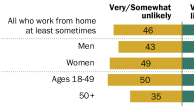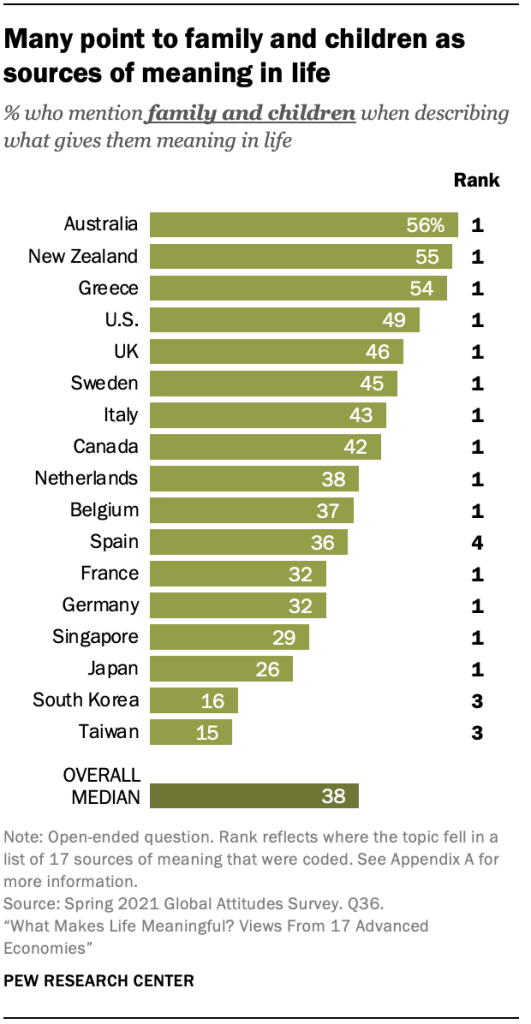
In almost every public surveyed, substantial shares identify others in their life as a source of meaning. Family is most frequently mentioned in almost all survey publics and appears within the top five sources of meaning in every place surveyed. Some people also cite romantic partners and their friends and community. When mentioning finding meaning in others, not everyone limits themselves to the humans in their lives – some also make a point to cite their pets, too.
Family and children
With few exceptions, family is by far the most frequently mentioned source of fulfillment in life for people in these 17 publics. A median of nearly four-in-ten adults (38%) mention finding meaning in their immediate or extended family, children or grandchildren, parenthood or other aspects of their familial relationships. In places like Australia, Greece, New Zealand and the U.S., roughly half or more mention family when discussing what gives them meaning.
“I think family is very important in my life. You practice what you preach. And contributing to society and instilling strong values and a sense of respect in my children to treat others as they want to be treated.” –Woman, 52, Australia
While many people offer more than one thing that gives them meaning in life, in responses where people mention just one source of meaning, family appears more commonly than any other topic. For example, in Greece, 20% of responses are only about family and nothing else. As one older man in France observed, “My family is something that satisfies me, family is everything.” A young person in New Zealand echoed a similar sentiment: “For myself I believe that family is a very important part of my life. If anything else changes I wouldn’t mind as long as family is around.”
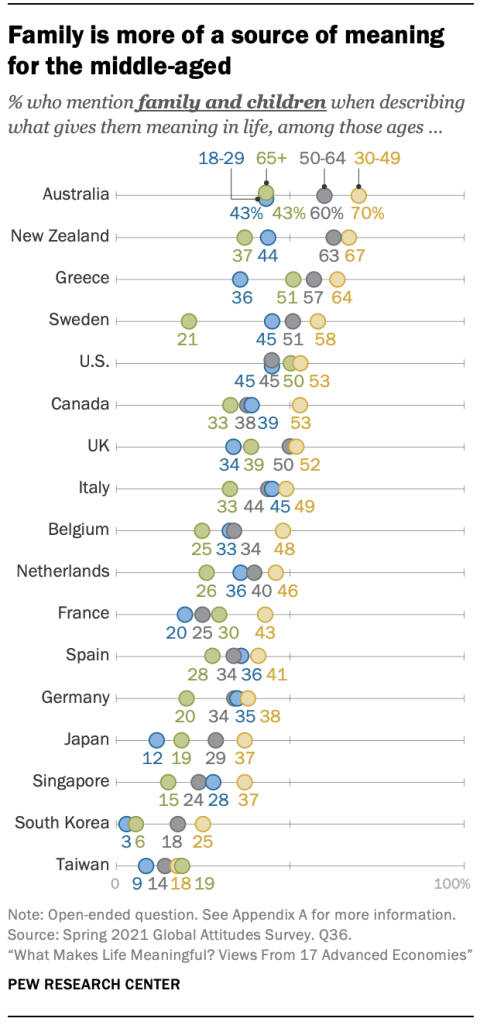
While family is the top source of meaning across most publics – the notable exceptions being South Korea, Spain and Taiwan – it is considerably more important for those ages 30 to 49 in most places surveyed – an age group that is especially likely to have children at home. For example, in Australia, 70% of those ages 30 to 49 mention their family as a source of meaning, compared with 60% of those ages 50 to 64 – and fewer than half of those either under 30 or ages 65 and older.
More affluent people are also somewhat more likely to mention family as a source of meaning in many of the publics surveyed. In New Zealand, for example, around two-thirds of those who have incomes at or above the median cite family in their answers, whereas fewer than half of those who are less well-off say the same. To a lesser extent, mentions of family were also higher among more educated people in most places.
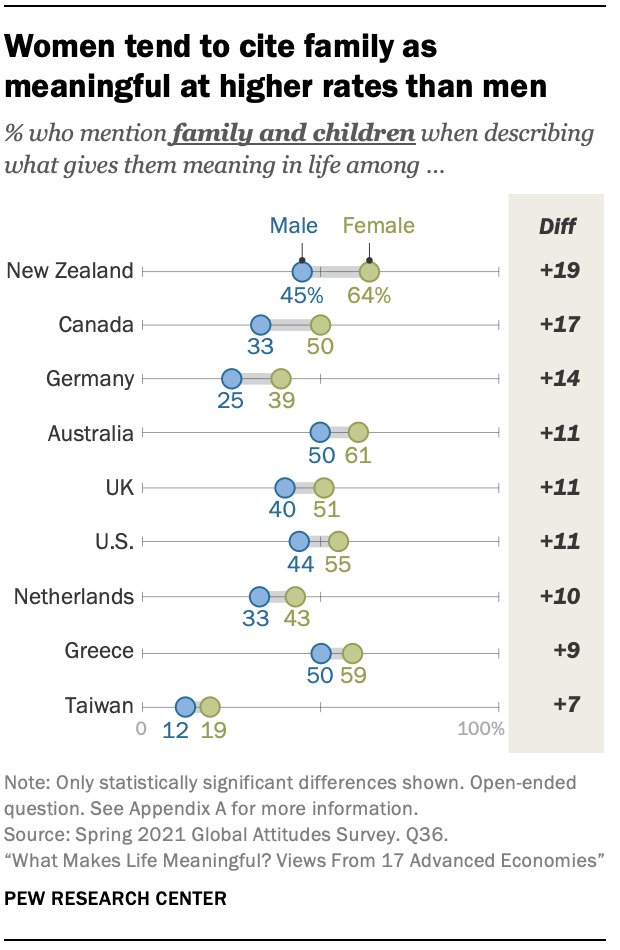
Women are also often more likely than men to mention their families or children. In New Zealand, for example, around two-thirds (64%) of women mention their families, while fewer than half (45%) of men say the same. Notably, this gender gap is not as prominent in Spain and Italy or in Asian publics where family is mentioned less frequently overall (South Korea, Singapore, Japan).
Spouses and romantic partners
Though references to the family or children are far more common, some people specifically mention their spouse or romantic partner as an important source of meaning, or make some sort of reference to marriage, dating or romantic love in general. Many emphasize companionship with their partners, like one French woman who enjoys “playing Scrabble and other board games with my husband every night.” Laughter and humor are also a theme. As one Japanese man mused, “I laugh together with my wife at least once a day.” A Dutch woman similarly reflected, “I am not alone, [I] have my husband, and I am very happy about that, especially in these times.”
“My wife gives me a reason, not just to survive but to thrive … Her questions and views make me think (and laugh).” –Man, 67, United States
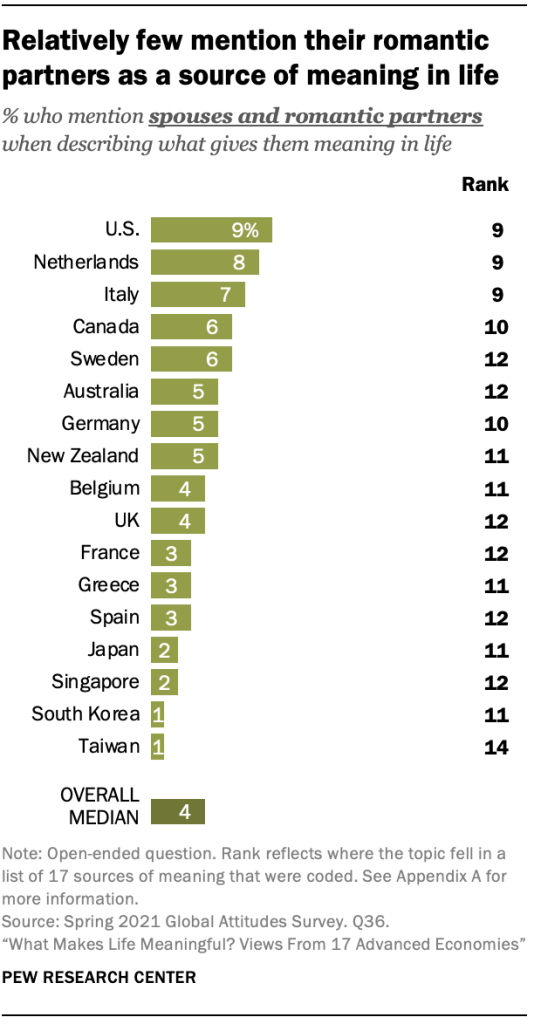
Others describe how their relationships help them overcome difficulties and inspire them to be better. As one American man explained, “I recently became a husband and I derive meaning every day from trying to be a better partner to my spouse – to learn how we can grow together as a couple and how we can try and make the world around us a better place.” Another woman, also in the U.S., said of her husband, “He is thoughtful and supportive and gives me ground to stand on when everything else falls apart.”
Relatively few (4%) mention their spouse or partner in the median public, but the U.S. and Taiwan stand out as notable exceptions. Nearly one-in-ten U.S. adults (9%) mention their spouse or partner, and it is the ninth most commonly mentioned source of meaning there. By contrast, it is among the least-mentioned topics in Taiwan, where fewer than 1% of the public mention their spouse or partner.
Friends, community and other relationships
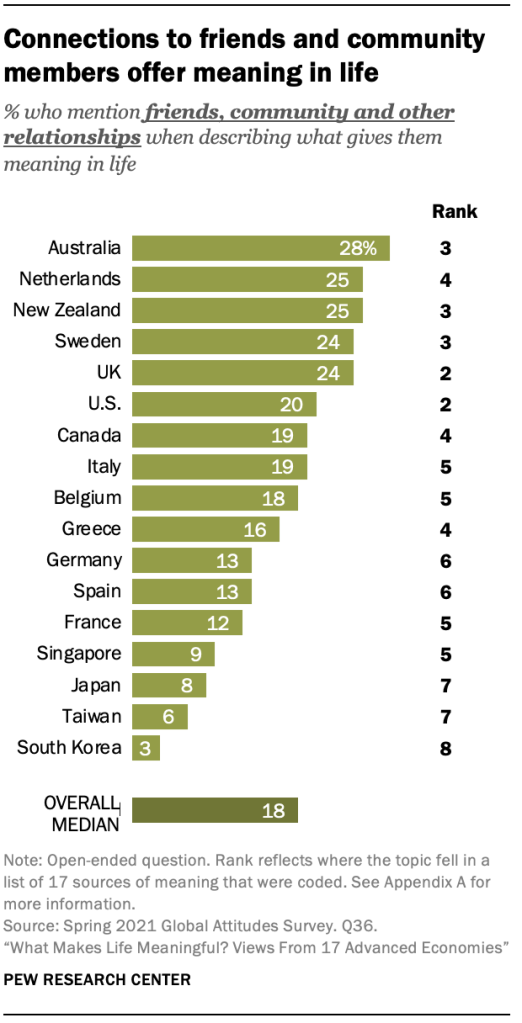
Substantial shares also mention relationships with friends and community when identifying sources of meaning in their life. For instance, one Italian woman said, “[M]y family, being together with my loved ones, my wife, my son, being at peace with myself and my friends, acquaintances, and all those I can spend time with,” and another woman in Greece said she finds meaning from her “personal life and social life with friends and people we are close to.” Some mention these connections in the context of COVID-19, such as a German man who said, “I find it remarkable how the COVID crisis affected our behaviors. I, for one, appreciate very much personal contact with those around me.”
Australians are the most likely to bring up ties to friends or community (28%). About a quarter also mention relationships with people outside the family in the Netherlands, New Zealand, Sweden and the UK. In each of these countries, too, community and friends are one of the top four factors mentioned.
“Having a rapport with others. Even if my friends have a different way of thinking than I do, we talk about it and communicate, and foster an understanding.” –Man, 18, Japan
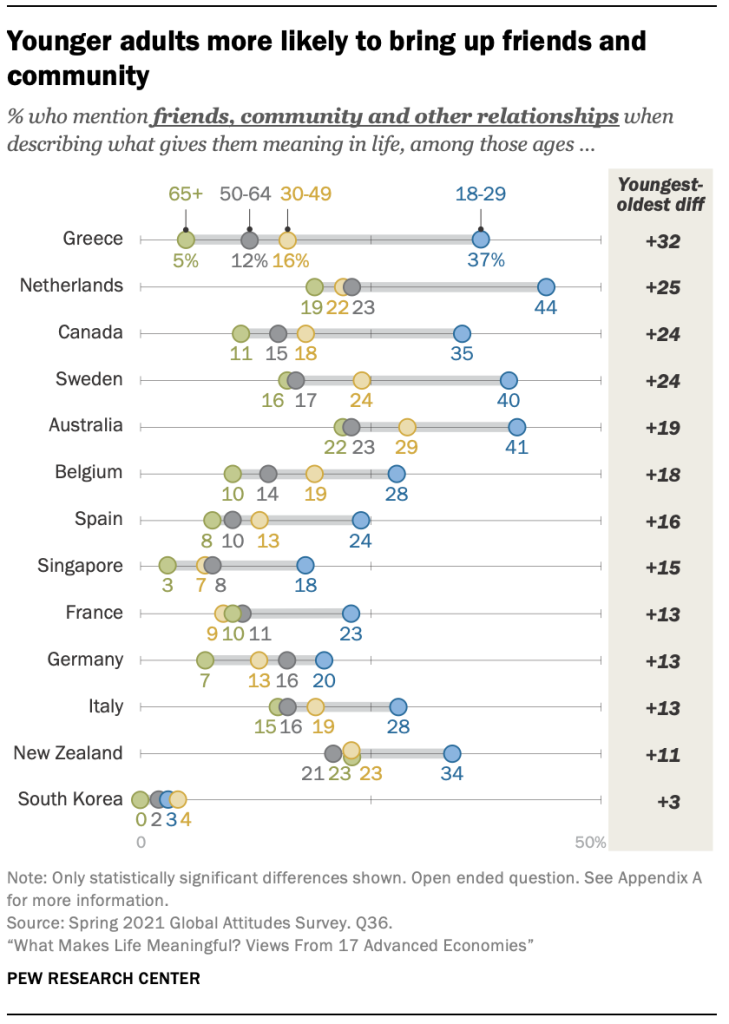
East Asian publics, on the other hand, are the least likely to mentions friends or community; no more than one-in-ten bring up these relationships in these places. In Taiwan, South Korea and Japan, community is not mentioned as a top source of meaning.
In many survey publics, younger adults – those ages 18 to 29 – bring up their friends and community more frequently than older counterparts. The age difference is greatest in Greece: 37% of young adults talk about their friends or other relationships outside of their family, compared with just 5% of those 65 and older.
Friends and community are also mentioned more frequently by those with more education in five of the surveyed publics. In the U.S., for example, 31% of those with a postsecondary education or more speak about their friends or community when discussing what brings meaning to their lives, while 13% of those with less than a postsecondary education say the same, a difference of 18 percentage points.
Those on the ideological left also tend to be more likely to mention friends or community than those on the right. For example, 29% of left-leaning Canadians mention finding meaning in their friendships or community relationships, while just 11% of right-leaning adults in Canada say they do so. Similar differences also appear in six of the other surveyed publics.
Pets
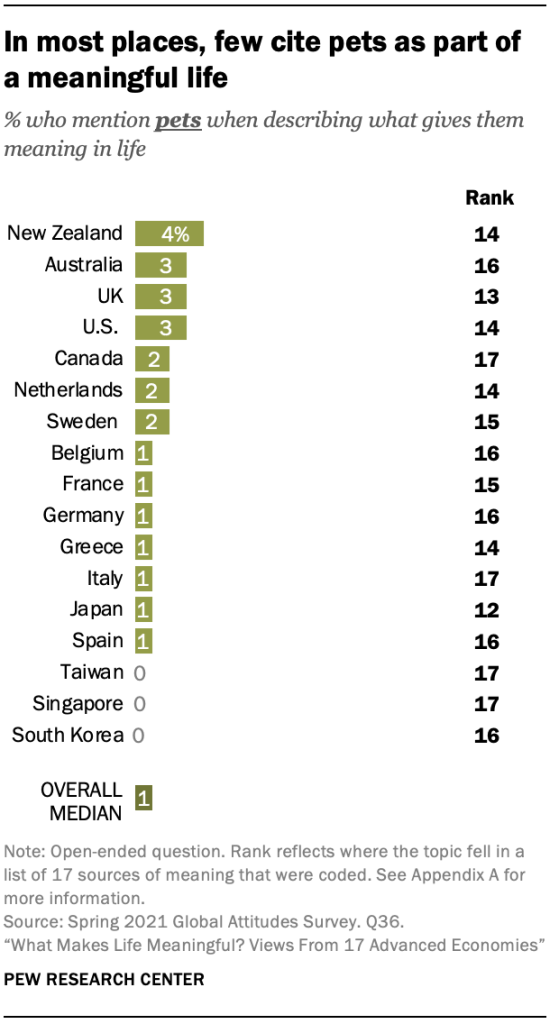
Although not commonly mentioned in any of the surveyed publics, pets are a source of meaning for 4% of adults in New Zealand and for 3% of Americans, Australians and Britons. Outside of these particular countries, very few in most places – and none at all in both South Korea and Taiwan – mention their animals as a source of meaning.
“I find being around my family and animals, especially my dog, my cat and my horse, very fulfilling, and they give me peace of mind. They make my day feel good. If I did not have them around, I would be bored out of my tree.” –Woman, 60, New Zealand
Responses mentioning pets sometimes occur alongside responses that mention hobbies and recreation. For example, one Briton said: “I like country walks, communing with nature and pets.” In New Zealand, 12% of those who mention hobbies and recreation also mention their pets, compared with the 2% of those who do not bring up hobbies. And in the U.S., 14% of respondents who identify hobbies as something that give their lives meaning also point to their pets, compared with the 3% of those who do not mention hobbies. One such respondent in the U.S. said what they found meaningful was “taking time to play with my dog and explore nature parks with her.”

